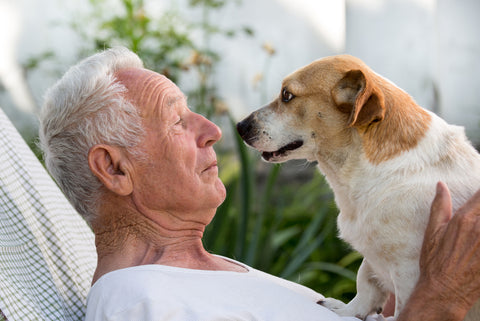Caring for Senior Dogs: Tips for Your Aging Pet

Here, Vetnique Labs shares tips to help when caring for elderly dogs.
Help Aging Dogs Stay Active
You might have heard the term “Motion is lotion” applied to humans and the importance of living an active lifestyle. The same rules apply to your pet. When dogs remain active, they are less likely to lose muscle mass which can make them age more quickly. Consider taking longer walks, so they can keep their own pace, but be active for a longer period of time. You can also try to engage older dogs by playing their favorite games to encourage them to remain active.

Watch for Decreased Energy Levels
Although it is natural for your dog to decrease activity levels as they age, you need to be sensitive to the fact their inactivity could also be a symptom of an underlying condition. If you notice signs your elderly pet is in pain, or their energy level is noticeably slowing, speak to your veterinarian. They can determine if your pup is experiencing difficulties, or is just slowing down due to age.
Watch Their Weight
Weight gain for your senior dog is just as bad for them as it is for you. This is one of the reasons keeping your dog active is important. More physical activity will help reduce the risk for weight gain as will a healthy, age-appropriate diet. Speak to your vet about the right diet for your senior canine. Also keep in mind that weight can make it more difficult for your pet to move around, and put strain on joints.
Check Bloodwork for Senior Dogs
You might not bring your dog to the vet unless they show signs something is wrong. However, as your dog ages, it is best to set up regular physicals at least annually if not biannually. Your vet will perform a thorough exam including blood work to check for things such as kidney and liver function. The sooner health issues are detected, the sooner your pet can receive treatment to keep them healthy and reduce symptoms that can make them uncomfortable.
Help Improve Their Sleep
Older dogs might experience sleep issues due to pain or discomfort. Consider investing in an orthopedic or heated dog bed to keep them more comfortable when they sleep. The more well-rested they are, the more likely it is they can live a happier, more comfortable life. You can also provide a heating pad to sleep on that can help keep them from feeling overly achy. A heating pad designed specifically for dogs is the best choice.

Assist Them with a Dog Support Sling
A dog support sling is an ideal solution for dogs with mobility issues. Also available as dog harnesses, you can use these handy supports to help your dog stand, get upstairs, get into the car, use the bathroom, etc. Choose one with a handle so you can offer added assistance when they need it.
Food and Water Access
It might become more difficult for your aging dog to access their water and food bowl. Elevated bowls on a platform can reduce strain. You can also consider placing water bowls throughout the home, so your pet doesn’t have to travel far when they are thirsty. In fact, aging pets can have memory issues so they might not remember where to find their food and water.
These simple tips can help your senior dog age more comfortably and enjoy a better quality of life in their golden years.
Help Them “Age in Place”
“Aging in place” allows you to stay in your own home to maintain independence in the place you love. With a few minor changes, your home becomes safer and allows you to remain mobile. Some simple changes can make it easier for your aging pet as well. Changes can be as simple as laying more carpets over hardwood, so your pet is less likely to slip. If this isn’t an option, providing non-slip dog socks can give them more traction.
Portable dog ramps can make it easier for your pet to access the stairs, get up onto their favorite chair or get into your car. Installing motion lights can also be helpful, as night vision is one of the first things to go as a dog ages. Last but not least, consider installing gates at the stairs to prevent falls.












